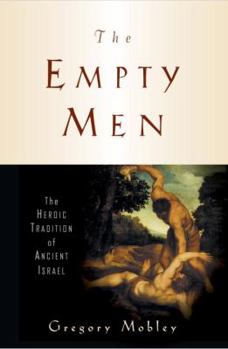The Empty Men: The Heroic Tradition of Ancient Israel
(Part of the Anchor Bible Reference Library Series and The Anchor Yale Bible Reference Library Series)
Select Format
Select Condition 
Book Overview
The Empty Men describes the process by which adventure stories--replete with foolish love, warfare, assassinations, ritual slaughter, and grim masculine codes--were transformed into sermons and... This description may be from another edition of this product.
Format:Hardcover
Language:English
ISBN:0385498519
ISBN13:9780385498517
Release Date:December 2005
Publisher:Anchor Bible
Length:294 Pages
Weight:1.35 lbs.
Dimensions:1.0" x 6.5" x 9.4"
Customer Reviews
2 ratings
Informative and creative explanations
Published by Thriftbooks.com User , 18 years ago
Mobley provides a very close reading reading of these texts, often providing interpretations that clarify and enlighten. For example, Ehud is described as a kind of iron age James Bond who enters the Moabite king's inner chamber with a hidden weapon literally up his sleeve, assasinates him, and escapes without the guards even noticing. The guards do not enter the chamber because they think the king is still "covering his feet". Mobley explains the meaning of this idiom -- he has lowered his robe while moving his bowels. Mobley also suggests that instead of saying the guards "waited" we should translate this as "dilly-dallied" -- this better captures the sense and the original Hebrew word is a rhyme like that.
Interesting though incomplete
Published by Thriftbooks.com User , 18 years ago
Perhaps no book in the entire biblical cannon receives such scant reading as Judges. Though several characters within the story, Samson being a prime example, get considerable extra textual attention, the Book of Judges itself remains an off putting text at best. The reasons for this become obvious once one gives it a full reading - beyond being certainly the most violent book of the Bible; its heroes include some of the cannon's most ethically ambiguous characters. Another reason of course is that Judges with its plethora of characters and frequent moral lapses stands in stark contrast with the other account of the conquest of the land, the Book of Joshua. Indeed, even G-d appears at his most rough in the Book of Judges. In one cycle that follows the text's recurrent pattern of lapse into idolatry, punishment exacted by a foreign oppressor, pleas to the Divine for redemption, and the anointing of a deliverer, G-d replies to the people's pleas with a curt, go ask your idols. Given the depth and complexity of Judges, as well as the scant scholarly attention it's received in comparison with other biblical texts, one must welcome any new analysis. Professor Gregory Mobley approaches Judges from an interesting vantage point, wishing to examine the idea of the "empty men," characters that rise from marginal social positions to become leaders of the people of Israel. As a starting point, its stands as an interesting one, offering the author the chance to use not just tools of textual analysis, but those rising from the social science of anthropology and sociology as well. And as far as Professor Mobley take it, which is unfortunately not far enough, it makes for an interesting and thought provoking read. Professor Mobley examines three of the "Judges," Ehud, Gideon, and, of course, Samson. In each case he provides an interesting textual analysis and, particularly in the latter two cases, a rather complete review of the modern textual theories that have deconstructed the texts. The author further does a fine job of showing how all three of these characters stand as iconic figures with more than a few parallels in other cultures - Samson as the "wild man" for example. Yet for all of the strength of his analysis several missing pieces leave one wishing this relatively short text were double its current length. While dealing with the "stars" of Judges, several of the more minor "heroes" would have proven interesting candidates for analysis and helped illuminate the author's thesis. Jepthah in particular, the iconic foolish warrior who makes a foolish pledge to sacrifice the first thing he sees when he returns home from war if only he is granted victory, and who of course first beholds his daughter, would have stood as a character particularly worthy of consideration. Further, while the author does contrast Judges with Samuel in the shifting social structures in the evolution to a more urbanized monarchic culture, his attention focuses






